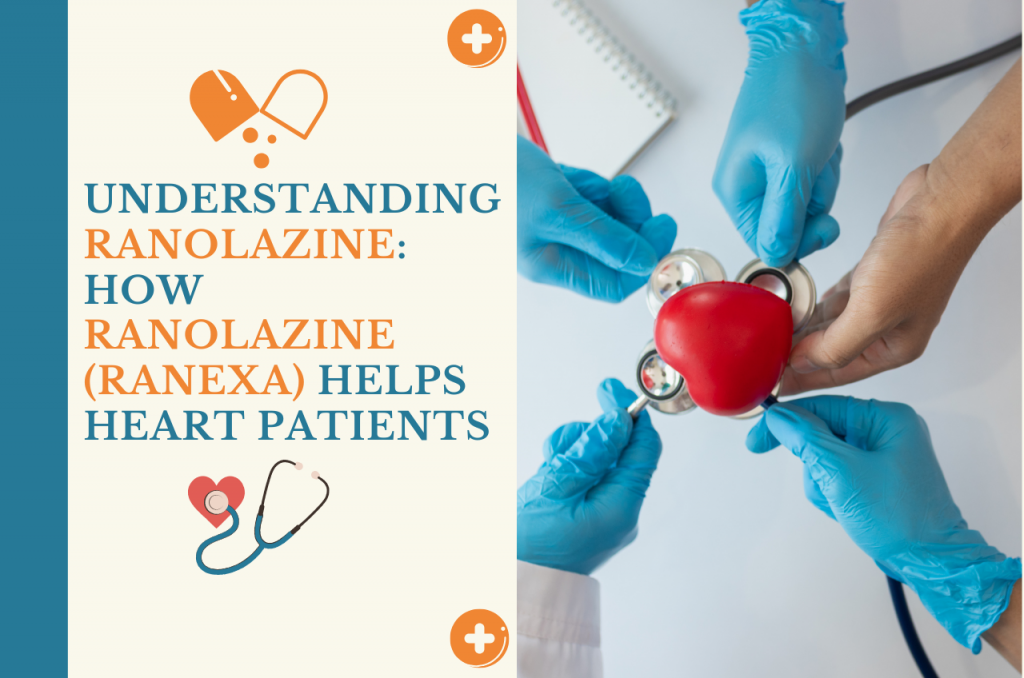Patients suffering from coronary artery disease have a common manifestation of chronic stable angina pectoris. Angina is described as pressure, squeezing, heaviness, tightness, or pain in the chest. It occurs when there is insufficient oxygen-rich blood supply to the heart muscles.
Heart patients with chronic angina are at high risk of strokes, heart attacks, and other cardiovascular events, so they should get proper medical treatment. Antianginal medications can help manage angina symptoms, and one of the drugs that belongs to such a class of medicines is Ranolazine (Ranexa).
This guide details Ranolazine (Ranexa) medication and how it benefits heart patients. It includes information on the uses of Ranolazine (Ranexa), how Ranolazine (Ranexa) works, benefits of Ranolazine (Ranexa), side effects of Ranolazine (Ranexa), and Ranolazine (Ranexa) dosage guidelines.
What is Ranolazine (Ranexa)?
Ranolazine is a generic anti-anginal drug. It is popularly marketed under the brand name Ranexa, among others. It is a prescription medicine that was FDA-approved in 2006 for the treatment of stable angina pectoris. Since then, it has been given by doctors to adults with chronic angina.
The medication can manage continual pain or pressure in the patient’s chest, but it does not help when there is an acute (emergency) angina attack. It may even be used for other medicinal purposes, as mentioned later in this guide.
Ranolazine is the active ingredient in Ranexa tablets. It’s a racemic mixture, a piperazine derivative with the chemical name 1-piperazineacetamide, N-(2,6-dimethylphenyl)-4-[2-hydroxy-3-(2-methoxyphenoxy) propyl]-, (±)-.
How does Ranolazine (Ranexa) work in the Heart?
This is how Ranolazine (Ranexa) works In coronary artery disease, myocardial ischemia occurs because of an inadequate supply of oxygen and nutrients, dissolved in the blood, to the heart muscles. This affects adenosine triphosphate flux, reducing the energy available for heart muscles to contract and relax. For normal beating of the heart, the sodium and potassium balance are necessary.
Disruption in these electrolyte balances results in excessively high sodium and calcium concentrations that further interfere with the oxygen supply to the cardiac muscle. All of this leads to angina symptoms.
Ranolazine (Ranexa) works to manage angina symptoms, but its exact mechanism of action is not fully understood. It has been elucidated that the drug works to inhibit sodium and potassium ion channel currents at the time of cardiac repolarization. As the electrolytes get in balance in the myocardium, it helps relieve angina symptoms.
Benefits of Ranolazine (Ranexa)
Ranolazine (Ranexa) is mostly used to manage chronic angina symptoms. Therefore, it is a promising medicine for treating such heart problems too. Furthermore, Ranolazine (Ranexa) is even found to be effective for patients with pulmonary arterial hypertension.
There are many benefits of taking Ranolazine (Ranexa), including:
- Reduced frequency of angina attacks
- Lower risk of progression of coronary artery disease and risk of serious ailments
- Improved exercise tolerance and stamina
- Enhanced life quality
- Reduced shortness of breath and fatigue
- A convenient oral dosing schedule, without regard to meals
- Affordable drug
- Granules are available, benefiting those who have difficulty swallowing pills.
Key Advantages of Ranolazine (Ranexa) in Heart Health
Ranolazine (Ranexa) is a medication that can help improve heart health in many ways. The key advantages of Ranolazine (Ranexa) for heart health include:
- Relief from angina symptoms. Ranolazine (Ranexa) helps lower the calcium ions flow into the cardiac muscle cells, helping the heart relax, thereby improving blood flow and treating chronic stable angina.
- Improved myocardial function: Ranolazine (Ranexa) makes the cardiac muscles more relaxed, reduces left ventricular diastolic stiffness, and improves myocardial contractility and perfusion.
- Reduced arrhythmias: Recently, as per an investigation done on Ranolazine (Ranexa), it has been found that Ranolazine (Ranexa) shows antiarrhythmic effects in different clinical scenarios like ventricular arrhythmias, heart failure, structural heart disease, channelopathies, and ischemic heart disease. Ranolazine (Ranexa) can be taken in adjunct with other medications that treat or prevent arrhythmias, such as amiodarone or dronedarone.
- Reduced ischemic events: In patients with diabetes mellitus, the use of Ranolazine (Ranexa) can reduce ischemic events—the damages caused by a reduced supply of oxygen-rich blood flow within the body.
- Decreased calcium overload: Ranolazine (Ranexa) lowers the overload of sodium and calcium that happens after ischemia.
- Improved duration of exercise: Ranolazine (Ranexa) increases the exercise capacity of the patient while reducing the worsening of angina.
- Improved microvascular blood perfusion: Ranolazine (Ranexa) improves the flow of blood through microvasculature—the arterioles, venules, and capillaries that are present in the heart.
- Well-tolerated by the heart, Ranolazine (Ranexa) does not affect the blood pressure and heart rate of the user.
To buy Ranolazine online, contact the best online pharmacy, LifeRxPharmacy.
Common Side Effects of Ranolazine and Safety Considerations
Ranolazine (Ranexa), just like any other drug, poses some unwanted effects. For some patients, the side effects are mild and temporary, but for others, the effects could be serious too. Rarely, do the side effects require immediate medical attention.
Some of the commonly reported side effects of Ranolazine (Ranexa) include:
- Dizziness
- Nausea
- Vomiting
- Spinning sensation
- Headache
- Constipation
- Dry mouth
- Stomach ache
Potential serious side effects of taking Ranolazine (Ranexa) include:
- Signs of an allergic reaction to Ranexa like swelling of your face, lips, tongue, or throat; hives; and difficulty breathing.
- Lightheadedness
- Fast or pounding heartbeats; fluttering in the chest
- Signs of kidney problems: less urination, swelling, seizures, and tired feeling
- Ringing in ears
- Tremors
- Blood in the urine.
If you experience any of the above-mentioned side effects or anything else that worries you, talk to your doctor for medical advice.
For safety reasons, before taking Ranolazine (Ranexa), it is advised to be careful and take some precautions to avoid experiencing any harm from the drug. It is recommended to:
- Avoid drug/disease interactions with Ranolazine by sharing information about your current intake of drugs and illnesses (if any) with your doctor.
- Avoid sudden discontinuation of intake of Ranolazine and its overdose or arbitrarily skipping the dose.
- Inform the doctor beforehand if you are pregnant, planning childbearing, or breastfeeding.
- Take Ranolazine as per the doctor’s advice and instructions on the label.
- Avoid Ranolazine if allergic to any of its contents.
- Avoid Ranolazine if you have liver cirrhosis or severe kidney disease.
- Avoid alcohol intake and grapefruit products while on the course of Ranolazine.
- Avoid driving or any hazardous activity until aware that your reactions can be impaired.
Ranolazine (Ranexa) Dosage Guidelines
Ranolazine is available in the form of tablets meant for oral administration. Swallow the tablet with a glass full of water. Do not chew, break, or crush it. Take medicine with or without food.
The suggested usual adult dose for patients suffering from chronic angina is 500 mg twice daily. If needed, the dose can be increased to 1000 mg twice a day.
Cost of Ranolazine (Ranexa)
The actual price of Ranolazine depends upon the pharmacy chosen, the buyer’s location, and whether the purchaser has any insurance coverage or financial assistance on the product. Users can save their money with discount coupons.
If a doctor has prescribed you Ranolazine medication, you can buy Ranolazine online at LifeRxPharmacy at reasonable prices for both small and bulk quantities.
FAQ’s
Who should not take Ranolazine (Ranexa)?
Ranolazine (Ranexa) is unsafe for use by patients suffering from liver cirrhosis, kidney failure, and long QT syndrome.
Can I take Ranolazine (Ranexa) with heart medications?
Some heart medications may interact with Ranolazine (Ranexa) while some may not. It is advised to inform your doctor about your current intake of medications before starting your treatment course with Ranolazine (Ranexa).
Can I stop taking Ranolazine (Ranexa) if I feel better?
You should continue your prescribed course of Ranolazine (Ranexa), even if you are feeling well. Discontinue the use of Ranolazine (Ranexa) only when your doctor permits.
Is Ranolazine (Ranexa) safe for long-term use?
Drug studies reveal that Ranolazine (Ranexa) is safe for medical use in the long term. However, patients taking Ranolazine (Ranexa) must regularly go for check-ups to see for any unwanted effects.
Can I drink alcohol while taking Ranolazine (Ranexa)?
No. Alcohol intake, while Ranolazine granules are in your mouth, can cause unwanted interactions and side effects.


